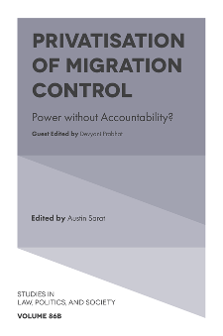Privatisation of Migration Control: Power without Accountability?: Volume 86B

Table of contents
(8 chapters)Section 1: Private Stakeholders in Migration Control
Abstract
Carrier sanctions oblige commercial entities to check the validity of passengers’ documents and deny boarding where no valid documents are shown, or where fraud is suspected. The necessity to flee to safer countries at a time of particular political unrest has necessitated the use of fraudulent documents, which the sanction regime and subsequent case law have attempted to curtail. However, increased investigation into legitimacy of travel documents has induced the taking of dangerous routes to reach Britain. In particular, danger is posed by oncoming traffic, and where entry is attempted clandestinely, within lorries. Men, accounting for the majority of irregular entrants, are more likely to experience danger. Due to the very nature of their precarious position, potential asylum seekers may not hold travel documents, which induce the taking of dangerous routes to make asylum applications once in Britain. This chapter will attempts to link carrier sanctions, danger, and humanitarian obligations.
Abstract
A Memorandum of Understanding (MoU) was uncovered in January 2017 detailing the sharing of patient data from NHS Digital to the Home Office. It signified a deepening of the hostile environment’s presence in the NHS, and was comprehensively rejected by medical professionals. In November 2018, following extensive action calling for its removal, the MoU was withdrawn. This chapter explores how three factors: the lack of legal basis, wide reaching effects, and ethical conflicts of the MoU led to the success of this action, and aims to apply these lessons to other areas of hostile environment policy. It will be established that ethics proved the most influential factor in inciting the opposition, however, all factors may have been integral to the overall success. It shall be demonstrated that, although the success of this action promises much with regards to charging policy, it may be of limited applicability to other areas of the hostile environment.
Abstract
Since January 1997, the UK has imposed sanctions on employers found to be employing irregular workers. Coercing employers into conducting immigration status checks makes it increasingly difficult for irregular migrants to secure employment opportunities, thus restricting their ability to sustain a tolerable life in the UK. The deputisation of employers, as well as other private entities, such as landlords, has become a pivotal element of what is commonly known as the ‘hostile environment’, an attempt to make UK life unbearable for irregular migrants. This chapter uses the social science critique of ethnocentrism to explore different forms of bias and discrimination embedded in the deputisation of employers. Dehumanisation and exclusion are the two manifestations of ethnocentrism focussed on: examples of these recurring issues are drawn from the justifications for implementation, and effects of the employer sanctions regime.
Abstract
The ‘hostile environment’ agenda of Government has effectively endorsed the deliberate exploitation of irregular migrants in the agricultural industry. This minor project of jurisprudence will provide two arguments in support of this hypothesis. Firstly, the vulnerabilities faced by irregular migrants are reinforced through the xenophobic narrative embodied within the law and the courts. The lack of priority afforded to modern slavery on the UK Policy Agenda has allowed a ‘grey labour market’ (1) to develop. Irregular migrants face a ‘precarity paradox’ and (2) they must avoid the carceral regime of immigration control by entering into unprotected and deliberately exploitative work. Secondly, a lacklustre attempt to remedy the corruption in the horticultural industry proves that the state is preoccupied, capitalising on irregular labour practice in the interests of state capital. Thus, the Government allows the commodification of workers within the supply chain to profit British businesses.
Section 2: The Political Economy and Commodification of Migration
Abstract
The East India Company was a hybrid corporation. This hybridity refers to the merchant-state function of the Company, designed as a joint-stock corporate established to trade and make profit, whilst simultaneously exercising public state governance over India. As the Company strived for profits, this was inherently detrimental to ruling a state of people. Its increasing public role alienated both Indians and the British government as it faced increasing criticism. Eventually British state intervention increased until the Company operated as an agent for British imperialism, and its corporate status continued to decline until the Company was replaced by British rule. Ultimately, the legacy of the East India Company represents the incompatibility of private actors taking on state responsibility.
Abstract
This chapter aims to critically access the Tier 1 (Investor) visa’s effect on the conceptualisation of the British Migration system. The scheme offers an exclusive route to temporary residency in the UK in return for a £2 million investment in Britain. It is contended that the government have consistently underestimated the continual detrimental effects of offering such a scheme due to their overarching pursuit for economic gain. As such, the scheme has imparted social disadvantage, highlighting the prevalence of inequality and the existence of a hierarchy of desired migrants. Furthermore, it is asserted that the investor scheme is facilitating threats to the public’s safety, exemplified in the recent Salisbury Novichok attacks. However fundamentally, this chapter will seek to illustrate that the Tier 1 (Investor) visa has commodified the UK’s migration system, bestowing investors with a ‘golden ticket’ and in turn disregarding the needs of the UK’s citizens.

- DOI
- 10.1108/S1059-4337202186B
- Publication date
- 2021-09-27
- Book series
- Studies in Law, Politics, and Society
- Editors
- Series copyright holder
- Emerald Publishing Limited
- ISBN
- 978-1-80117-663-7
- eISBN
- 978-1-80117-662-0
- Book series ISSN
- 1059-4337